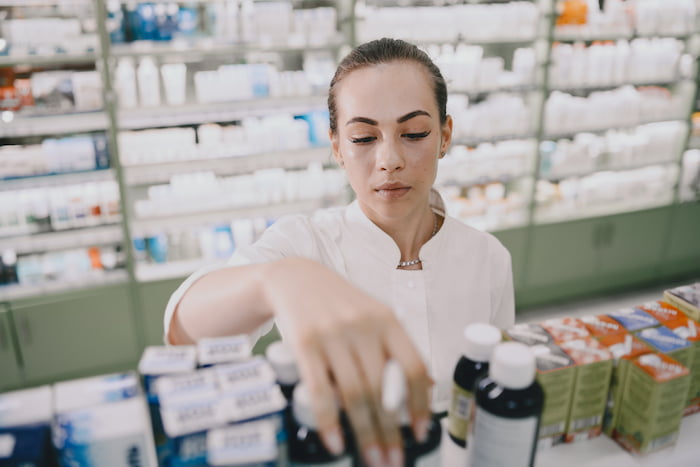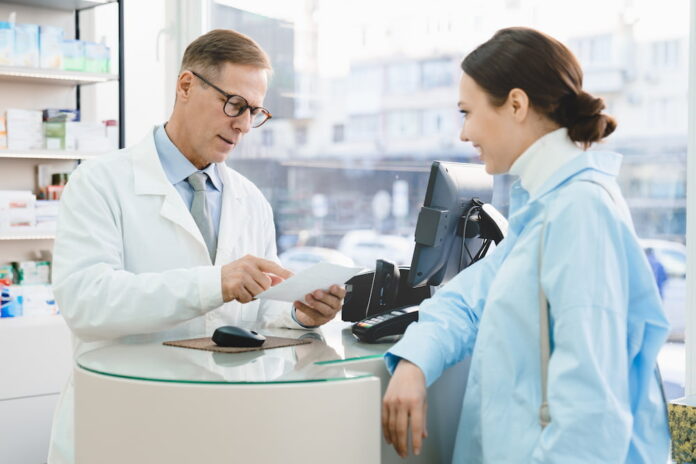Who’s the first person that comes to mind when you need to ask a question about medications? For most people, that person is a doctor. While physicians do have adequate knowledge of all types of drugs, pharmacists can also help you if you need any advice on how to use a particular medication, how it interacts with other drugs and other important questions we’ve covered in this article.
It may surprise you, but pharmacists may even assist you more if you need personalized answers about the medications you’re taking. That said, the first step is to know what to ask your pharmacist once you start taking a new prescription. You may believe that the medication label holds all the answers. However, these are often hard to understand and can’t answer more specific, personalized questions.
Pharmacists have studied all types of drug interactions, side effects, etc. And asking the right question can prevent many problems that could otherwise happen in the future. That said, here are 12 essential questions to ask your pharmacist.
1. What Does This Medication Do?
Some drugs, such as antibiotics, are made to help fight bacterial infections. Others are used to help with colds or relieve pain. Essentially, you should know how a medication affects your body to understand whether it’s working for you or not.
Skilled pharmacists, like those from the Everest Whole Health Pharmacy, will always know such information and will be glad to share it with you. So, don’t hesitate to ask them.
2. Is There a Generic Version of My Prescribed Medicine?

If your drugs are too expensive for you, there may be a cheaper option that could save you hundreds of dollars in the long run. You can ask your pharmacist whether there’s a generic version of the drug you’re taking.
But what’s the difference between a brand-name and a generic medication? The only difference is in their price – generic drugs are considerably cheaper than their brand-name counterparts while containing the same active ingredients and having equal restorative outcomes.
That said, asking your pharmacist about generic alternatives to the brand-name drugs you’re taking may help you save some money you’d otherwise unnecessarily spend.
3. Are There Any Side-Effects to This Medication?
When taking a particular drug, it’s vital to know its potential side effects. However, the list of potential side effects can be long, so you may want to ask your pharmacist to educate you about the most common and dangerous ones and how to handle them.
It’s a good idea to also ask whether there are certain instructions to adhere to prevent any side effects. If the side effects of the medication you’re currently using are too much to bear, is there any alternative you could try?
Getting answers to such questions will boost your knowledge of the drugs you’re taking, assisting you in taking better care of yourself.
4. Is There Any Written Information About This Drug You Can Take with You?
Apart from the regular labels, the manufacturer or even your pharmacy may offer extra materials about your medication that hold information written in a way that’s easier to comprehend than the insert found in your drug packaging.
5. How Should You Take Your Meds?
There’s a right way to take your medication and many wrong ways to do so. If you want to increase the effectiveness of your drug or prevent any problems, ask your pharmacist what the proper way to take that particular medication is.
Don’t be afraid to ask some more specific questions like whether you should take it with, before, or after a meal and whether you should take it in the morning or evening. If you’re taking any other medicine, make sure to ask whether it’s wise to use this one along with the others.
You need to know whether there’s something you should avoid when taking this drug, how long you need to take it, and how much time that medication takes to work. So, don’t hesitate to ask those questions too.
6. What if You Forget to Take Your Medicine?

Patients commonly forget to take their medication. While missing a dose may not seem disastrous, it may reduce the drug’s effectiveness. For this reason, asking your pharmacist what to do in such a case is vital.
Read Also
- Why comprehensive health insurance with maternity is beneficial in the UAEWelcoming a child is a significant milestone in any family’s journey. As exciting as this chapter is, it also brings with it a fair share of responsibilities—especially when it comes to planning for healthcare costs. Health insurance is now mandatory in the UAE, but as with any type of insurance, the smallest requirement might not… Read more: Why comprehensive health insurance with maternity is beneficial in the UAE
- Modern Approaches to Adolescent Mental Health Treatment for Lasting RecoveryWith increasing numbers of teens experiencing emotional and behavioral health concerns, adolescent mental health treatment has become more essential than ever. Conditions such as anxiety, depression, trauma and mood instability are on the rise, and effective support must evolve with these growing needs. Today’s treatment models blend evidence-based therapy with flexible access and holistic care, giving… Read more: Modern Approaches to Adolescent Mental Health Treatment for Lasting Recovery
- How to Find a 5-Star Dentist Near YouChoosing a dentist is more than just finding someone who can clean your teeth. It’s about selecting a trusted partner in your long-term oral health. A 5-star dentist not only provides excellent clinical care but also delivers a positive patient experience, from the moment you walk in until the moment you leave. Whether you’re new… Read more: How to Find a 5-Star Dentist Near You
- Your Easy-Peasy Guide to Brewing Amazing MatchaHey there! So, you’ve heard all the buzz about matcha – that vibrant green powder that’s not just pretty but packed with good stuff? It can seem a little fancy and intimidating at first, but trust me, making a delicious cup at home is simpler than you think. Forget complicated ceremonies for now; let’s just… Read more: Your Easy-Peasy Guide to Brewing Amazing Matcha
- Embracing Holistic Wellness: Insights from a Lansing, MI Health CenterReframing Health: Moving Beyond Symptom Management Treating only symptoms often offers quick relief, yet long-term results stay out of reach. When care zeroes in on isolated complaints, the bigger picture, such as stress, behavior, or lifestyle, often gets missed. Research shows that whole-person care, which looks at physical, emotional, and environmental factors, yields better outcomes… Read more: Embracing Holistic Wellness: Insights from a Lansing, MI Health Center
7. Where to Store Your Meds?
It matters where you store your meds because the stability of particular drugs can be affected unless you keep them at the right temperature. Typically, this means a dry and cool place at room temperature.
To protect your medication, make sure to check the information written on its label. Moreover, never leave your drugs in the car. If your meds were exposed to extreme heat, don’t take them before asking your pharmacist what you should do.
Another important reason for storing your medications safely is to prevent their misuse by adolescents who may find them in your medicine cabinet. As you may know, drug misuse can be fatal, and the best and simplest way to avoid that is to store your meds in a safe place where underage individuals can’t reach them.
8. When to Follow Up?
It’s essential to follow up frequently with your pharmacist to update them on your current health status. This way, they can understand what to do next regarding your health, such as increasing or reducing your dose.
9. Are There Any Activities You Should Avoid?
Some medications may reduce your physical and mental abilities and are best to be avoided when taking those particular drugs. For instance, you may not be able to go to the gym, drive, or have sex. That said, it’s vital to be informed about this, and one of the easiest ways to do that is by asking your pharmacist.
10. Is There Any Alternative if You Can’t Swallow Pills?
If you find your pills hard to swallow, ask your pharmacist whether there’s any alternative you can use instead, such as medications in the form of a liquid.
11. Is This Medication Safe for Pregnant or Breastfeeding Women?
Another important question to ask your pharmacist if you’re pregnant or breastfeeding is whether your medication is safe for you and your baby. This also applies if you’re planning to be pregnant in the future.
12. Are There Any Discounts on This Medication?

Like other goods you can buy, medication prices can vary depending on the pharmacy you’re buying it in. There may also be discounts or prescription coupons available on that particular drug you’re using, so don’t hesitate to check with your pharmacist about how you can save some dollars.
Stay Informed for Better Health
Taking care of your health is paramount. That’s especially true if you currently have a certain condition and need to use medications. Taking your meds the way they should be taken is vital to maximize their effectiveness, so don’t hesitate to ask your pharmacist anything you may want to know. They possess immense knowledge of all types of medications and possible interactions with other drugs, vitamins, herbs, etc., and will be glad to help you.
By having the information about the medicine you’re taking, you can take better care of your health, making you feel better and enjoy life more. So, stay informed!






